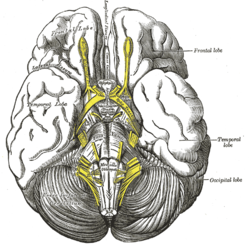Anterior perforated substance
| Anterior perforated substance | |
|---|---|
 Scheme of rhinencephalon (anterior perforated substance labeled at bottom left) | |
 Base of brain (anterior perforated substance labeled at center.) | |
| Details | |
| Identifiers | |
| Latin | substantia perforata anterior |
| NeuroNames | 282 |
| NeuroLex ID | birnlex_1096 |
| TA98 | A14.1.09.437 |
| TA2 | 5544 |
| FMA | 61891 |
| Anatomical terms of neuroanatomy | |
The anterior perforated substance is a part of the brain. It is bilateral. It is irregular and quadrilateral. It lies in front of the optic tract and behind the olfactory trigone.
Structure
[edit]The anterior perforated substance is bilateral. It lies in front of the optic tract. It lies behind the olfactory trigone,[1] separated by the fissure prima.[citation needed] Medially and in front, it is continuous with the subcallosal gyrus.[2] Laterally, it is bounded by the lateral stria of the olfactory tract, and is continued into the uncus.[2]
Its gray substance is confluent above with that of the corpus striatum, and is perforated anteriorly by numerous small blood vessels that supply such areas as the internal capsule.
The anterior cerebral artery arises just below the anterior perforated substance.[3] The middle cerebral artery passes through its lateral two thirds.[4]
Blood supply
[edit]The anterior perforated substance is supplied by lenticulostriate arteries, which branch from the middle cerebral artery.[4] It is also supplied by anterior choroidal artery.[4] Small branches from these create holes, which give the anterior perforated substance its name.[1]
History
[edit]The anterior perforated substance is named after the holes created by small blood vessels that supply it.[1]
Additional images
[edit]-
Human brainstem anterior view
-
Cerebrum. Inferior view. Deep dissection
See also
[edit]References
[edit]![]() This article incorporates text in the public domain from page 827 of the 20th edition of Gray's Anatomy (1918)
This article incorporates text in the public domain from page 827 of the 20th edition of Gray's Anatomy (1918)
- ^ a b c Doty, Richard L.; Bromley, Steven M.; Moberg, Paul J.; Hummel, Thomas (1997). "14 - Laterality in Human Nasal Chemoreception". Advances in Psychology. Vol. 123. Elsevier. pp. 497–542. doi:10.1016/S0166-4115(97)80081-7. ISBN 978-0-444-82510-0. ISSN 0166-4115.
- ^ a b Sen, T; Esmer, AF; Acar, HI; Karahan, ST; Tuccar, E (2011). "Arterial vascularisation of the anterior perforated substance". Singapore Medical Journal. 52 (6): 410–414. PMID 21731992.
- ^ Love, Betsy B.; Biller, José (2007). "22 - Neurovascular System". Textbook of Clinical Neurology (3rd ed.). Saunders. pp. 405–434. doi:10.1016/B978-141603618-0.10022-0. ISBN 978-1-4160-3618-0.
- ^ a b c DeMyer, William (2009). "2 - Applied Anatomy of the Brain Arteries". Stroke in Children and Young Adults (2nd ed.). Saunders. pp. 15–68. doi:10.1016/B978-0-7506-7418-8.00002-1. ISBN 978-0-7506-7418-8.
External links
[edit]- Atlas image: n1a8p1 at the University of Michigan Health System - "Interpeduncular fossa" (#6)
- Photo at umdnj.edu
- NIF Search - Anterior perforated substance via the Neuroscience Information Framework


